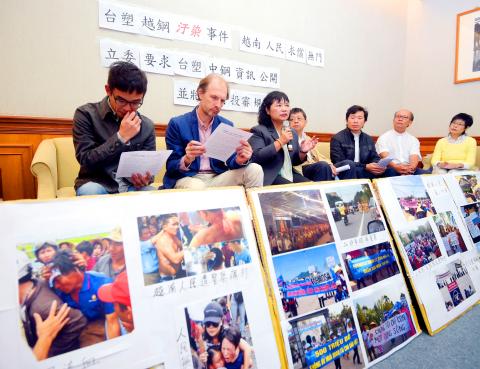A Vietnamese Catholic priest yesterday held a news conference in Taipei to complain about the operations of Formosa Ha Tinh Steel Corp, a Vietnamese subsidiary of Formosa Plastics Group (FPG).
Father Nguyen Dihn Thuc from the Catholic Diocese of Vinh, who was accompanied at the news conference by Taiwanese lawmakers and representatives of several non-governmental organizations, said pollution from the plant in Ha Tinh Province has severely affected the region’s residents physically and spiritually.
Vietnamese fishermen have been particularly affected as massive numbers of fish were poisoned by chemicals discharged by the steel plant in April, and without fish to sell, they are unable to buy food for their families or provide schooling for their children, Nguyen said.

Photo: Huang Yao-cheng, Taipei Times
He said he hopes the Legislative Yuan could help the Vietnamese in three ways: by demanding that the company publicize information about the level of pollution emitted by the steel plant; by providing specific details about cleanup efforts and compensation; and by ensuring that the plant is outfitted with proper equipment to process pollutants.
FPG on July 7 promised to pay US$500 million compensation to residents affected by the discharge of toxic waste and massive fish deaths in April.
The money has yet to be paid to the region’s residents, Nguyen said.
FPG should also be responsible for paying for health check-ups for those residents affected by the spill in April, he said.
If the steel plant cannot guarantee transparency of information, then it should be shut down and asked to leave Vietnam, Nguyen said.
The pollution caused by the plant has damaged Taiwan’s national reputation and would affect President Tsai Ing-wen’s (蔡英文) “new southbound policy,” he said.
The government and private corporations should take responsibility, Democratic Progressive Party (DPP) Legislator Su Chih-fen (蘇治芬) said, adding that she would ask the company to provide specific plans on how it plans to compensate for the damage.
Su said that she would pressure Formosa Plastics through state-run China Steel Corp, which holds a 25 percent stake in the company, adding that Taiwan should help other nations through democratic means while maintaining responsibility toward environmental conservation.
DPP Legislator Wu Kun-yuh (吳焜裕) said that during his most recent visit to Vietnam, he saw an increasing emphasis by the Vietnamese government on environmental protection.
Taiwan’s government should ensure that such concerns are included when it drafts its plans for the “new southbound policy,” he said.
Wu said that Taiwanese businesspeople abroad should ensure that environmental protection is a key part of their investments and make a good impression for Taiwanese businesspeople in general.
DPP Legislator Chen Man-li (陳曼麗) said the Legislative Yuan should consider ways that it could legally ensure Taiwanese investors adhere to corporate morals, adding that she would talk with the Executive Yuan about the issue.
While Nguyen said the affected residents have yet to receive compensation from FPG, Vietnamese Minister of Natural Resources and the Environment Tran Hong Ha said in a televised meeting held by the Vietnamese parliament on July 30 that FPG had paid US$250 million in compensation on July 28 and that the remainder was expected to be paid on Aug. 28.
Additional reporting by Diane Baker

An essay competition jointly organized by a local writing society and a publisher affiliated with the Chinese Communist Party (CCP) might have contravened the Act Governing Relations Between the People of the Taiwan Area and the Mainland Area (臺灣地區與大陸地區人民關係條例), the Mainland Affairs Council (MAC) said on Thursday. “In this case, the partner organization is clearly an agency under the CCP’s Fujian Provincial Committee,” MAC Deputy Minister and spokesperson Liang Wen-chieh (梁文傑) said at a news briefing in Taipei. “It also involves bringing Taiwanese students to China with all-expenses-paid arrangements to attend award ceremonies and camps,” Liang said. Those two “characteristics” are typically sufficient

A magnitude 5.9 earthquake that struck about 33km off the coast of Hualien City was the "main shock" in a series of quakes in the area, with aftershocks expected over the next three days, the Central Weather Administration (CWA) said yesterday. Prior to the magnitude 5.9 quake shaking most of Taiwan at 6:53pm yesterday, six other earthquakes stronger than a magnitude of 4, starting with a magnitude 5.5 quake at 6:09pm, occurred in the area. CWA Seismological Center Director Wu Chien-fu (吳健富) confirmed that the quakes were all part of the same series and that the magnitude 5.5 temblor was

The brilliant blue waters, thick foliage and bucolic atmosphere on this seemingly idyllic archipelago deep in the Pacific Ocean belie the key role it now plays in a titanic geopolitical struggle. Palau is again on the front line as China, and the US and its allies prepare their forces in an intensifying contest for control over the Asia-Pacific region. The democratic nation of just 17,000 people hosts US-controlled airstrips and soon-to-be-completed radar installations that the US military describes as “critical” to monitoring vast swathes of water and airspace. It is also a key piece of the second island chain, a string of

The Central Weather Administration has issued a heat alert for southeastern Taiwan, warning of temperatures as high as 36°C today, while alerting some coastal areas of strong winds later in the day. Kaohsiung’s Neimen District (內門) and Pingtung County’s Neipu Township (內埔) are under an orange heat alert, which warns of temperatures as high as 36°C for three consecutive days, the CWA said, citing southwest winds. The heat would also extend to Tainan’s Nansi (楠西) and Yujing (玉井) districts, as well as Pingtung’s Gaoshu (高樹), Yanpu (鹽埔) and Majia (瑪家) townships, it said, forecasting highs of up to 36°C in those areas